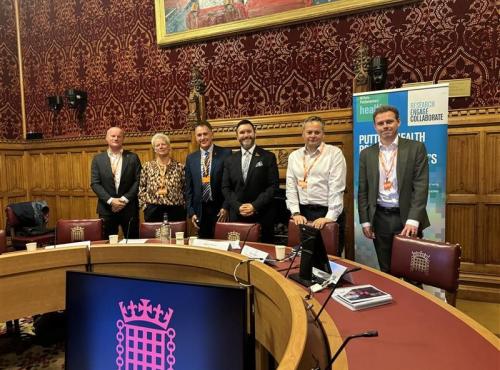FETL Winter Symposium 2019 – ‘Setting up the Future: FE beyond 2020’
The FETL Winter Symposium 2019 was held at the House of Commons on Wednesday 11th December 2019.
The event brought together sector leaders, academics and practitioners to discuss how to set out an ambitious, long-term vision for the future of further education beyond 2020. The panel was made up of Baroness Alison Wolf of Dulwich, who was part of the Augar Review into Post-18 Education and Funding; James Kirkup, the Director of the Social Market Foundation; Lesley Davies OBE, principal and CEO of the Trafford College Group; and Kirstie Donnelly MBE, Group Managing Director at the City & Guilds Group. The event was chaired by Stephen Exley, Further Education Editor at Tes.
The panel discussion was followed by a Q&A session, and the following topics were discussed:
- The profile of FE
- Higher Education (HE) versus Further Education (FE)
- Funding for FE
- Stability for the FE sector
1. The profile of FE
There was broad consensus amongst the panellists that FE had gained an increased profile in recent years. Panel chair Stephen Exley noted in his opening comments that FE formed a significant part of all three of the major political parties’ manifestos in the general election, proving that things had begun to change in this area of education policy. However, the dominance of post-18 education in the media was picked up on by Baroness Wolf and James Kirkup, who agreed that HE took far more than its fair share of coverage. Baroness Wolf called it a ‘national obsession’, and noted that when former Prime Minister Theresa May launched the recent Augar Report, she was only asked questions about HE rather than FE. Panellist James Kirkup went further, claiming that in his 20 years as a journalist, he witnessed FE being driven out of the agenda by the owners of national newspapers who refused to report on it. He went on to say that the lack of political discussion around FE ‘should be a point of national outrage’, and called for FE to be given a greater representation in national debate. Kirkup suggested that there ought to be an FE minister who could provide an institutional voice for the sector, and called for greater political consideration of the purpose and mission of FE in the UK.
2. Higher Education (HE) versus Further Education (FE):
Keynote speaker Baroness Wolf noted the changing attitudes towards further education and commented on how it is now widely considered to be as important as higher education. The recent Augar Review was the first report to look across the piste of 18+ education since the 1960s, a welcome sign that FE is no longer being neglected as a credible option for school leavers. However, Baroness Wolf urged the audience not to be complacent and believe that the battle had been won. She commented on how the Augar Review highlighted a yawning gap in the opportunity between those who choose FE and those who go on to university, and its recommendations reflect the need to address this disparity. Kirstie Donnelly MBE agreed that HE was often seen as FE’s ‘big brother’, particularly in regards to funding where FE loses out as the ‘poor relation’. James Kirkup claimed those in charge of the media were ‘obsessed’ with university, and wilfully ignore the other half of the country who do not go on to HE.
3. Funding for FE
Perhaps predictably, one of the biggest topics of discussion at the event was around the funding of FE, and panel chair Stephen Exley concluded his opening statements by alluding to the broad industry consensus that it needed greater investment. Lesley Davies OBE labelled the FE sector ‘financially fragile’, and lamented the complexity of having a funding system with multiple different pots of money. She also called for more funding to be spent with SMEs, as they are the vast majority of businesses in the UK. Baroness Wolf called for the impact of funding rates to be better understood by government. She claimed that outside the sector, few people seem to appreciate that it is not about the overall budget allocated to FE, but rather the rates for individual courses and colleges. The apprenticeship levy also attracted a lot of debate. The broad consensus was that it should be kept; however, it must be reformed to better suit the needs of the country. Kirstie Donnelly MBE suggested that the apprenticeship levy should have greater flexibility built in and clear guidance on how it will be divided and delineated. Baroness Wolf agreed on the need for a levy, and stated that she believes the UK should mirror successful systems abroad. During the Q&A section Mark Dawe, CEO of AELP, suggested that student loans should be used to at least partially fund degree apprenticeships, rather than all the funding for them coming out of the levy.
4. Stability for the FE sector
Panellists Lesley Davies OBE and Kirstie Donnelly MBE were amongst the most vocal advocates for greater stability for the FE sector. Davies stated that she believed the main issue for FE goes beyond funding, and was more to do with the lack of security that the sector has faced for so long. She called for a radical review of sustainable funding, which would reflect a systematic change in the relationship between government and the sector. Davies described her belief that the FE sector is overly managed and suffering from a wave of growing regulation and monitoring that has no benefit to either students or employees. She called for a greater level of trust between the sector and government, and for FE to be given the same protected status which HE benefits from. Kirstie Donnelly MBE agreed that greater stability was critical, as the sector had seen more change than any other part of education policy, and also stated that FE should stop being ‘kicked around like a festive football’. Donnelly called for a fundamentally cross party approach, that would finally give FE the continuity it deserves, and encouraged her sector colleagues to be ambitious and hopeful in their aspirations for the next decade.
Dame Ruth Silver, the president of FETL, closed the event by talking about the work that FETL has been doing over the past year. In 2019 FETL have produced 15 projects, 10 papers, and hosted 4 symposiums, with 2 more planned for the new year. FETL has also funded three commissions, two of which will be reporting their findings in 2020. 12 more reports will also be coming out in 2020, on topics such as establishing an institute for technical teacher training, prison education programmes, and the role of governance. Dame Ruth’s New Year’s wish was that we remind ourselves that the heart of the matter is learning, and we need to talk in a way that means people will listen. We need to take this new decade to reboot, and devote ourselves to this task. The future’s not a place you’re going to, it’s a place you’re making all the time.



